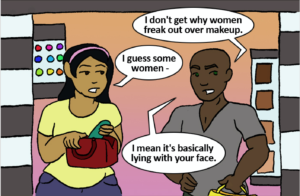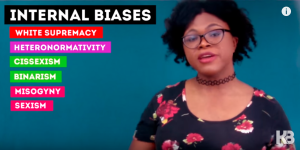
Young person is thinking.
As a millennial, I heard the same advice repeatedly during my senior year of college: “Live with your parents for a couple of years while you figure out what you want to do next, and save money.”
I knew that wouldn’t be a long-term option for me. My dad and I are close and I enjoyed living with him, but he’s unable to support me financially and has his own serious health issues to deal with.
We both have wildly different sleep schedules, and it was exhausting during the two months I lived with him after my college graduation.
While trying to fall asleep, I could hear him awake, watching TV and eating food. I have a physical disability, and and I know how important proper sleep, exercise, and nutrition are to living each day without debilitating daily symptoms.
For broke millennials, the reality that we may not be able to lean on our parents as a safety net for months or years after graduation is stressful. I spent a lot of my final year at college worrying about how I’d be able to make the transition.
My dad and I were both poor, so I knew there wasn’t any money sitting around in saving accounts, waiting to cover my moving costs or pay my bills while I looked for full-time work.
I was fortunate in many ways. I was accepted into graduate school, and knew that my grant would be able to help me cover the cost of moving. I was able to share rent and expenses with my long-term romantic partner, and it was an active choice for us to move in together—not something we did out of necessity.
And I was lucky to get a full-time paying job just weeks out of college, and although it didn’t give me any benefits, it allowed me to pay for furniture and a security deposit.
Not all millennials have those opportunities. Many of us are faced with an inability to live with parents or family because they are no longer alive or don’t live in this country.
And there are numerous other reasons: They’re abusive. They can’t afford to take care of us. They’re living in (or moving to) senior or disability housing. They’re too ill to take care of us. Or they’ve kicked us out because of our gender or sexuality.
Some people age out of the foster care system and don’t have families to support them. To anyone who knows that moving back in with a parent or family member isn’t something they can do, it’s tough to figure out next steps or climb out of a financial setback.
If you’re a millennial who can’t move in with your parents — whether you recently graduated from high school or college, or you’ve been on your own for a while — here are some options you can look out for to make the transition less burdensome.
1. Look for intentional community housing.
Not all housing situations are an apartment that you rent by yourself or with others. There might be intentional community housing in the area where you’re looking to live. Sometimes intentional communities are grouped by commonalities, like being the same religion, being in the LGBTQIA+ community, or being a person of color.
Intentional community housing can be an excellent resource if you’re unable to live with parents or family, and they’re particularly common in high cost rental markets and expensive cities like San Francisco.
There are quite a few regional Facebook groups specific to queer housing and you can find them with just a quick search on the site. They’re not exactly the same as intentional housing, but it helps people in the LGBTQIA+ community find each other and create safe housing situations.
2. Find rentals that don’t check credit or use a cosigner.
A lot of common tips about finding housing without a credit check aren’t applicable to marginalized people, who might not have a high salary or massive savings to pay more upfront. Rentals from an individual landlord might not require a credit check to begin with, although it can take a lot more searching to find them.
I knew that I couldn’t use my dad as a cosigner. He has extremely bad credit and a very small income as a disabled retiree. That’s why I looked into cosigner services, which might be an option if you really need one to qualify for your prospective apartment.
3. Take out a small loan.
I try not to advise people to take on debt, especially if they have any existing credit card debt or student loans. But sometimes we need to do this to survive. And it’s an even better option if you know you’ll be able to pay it off soon or if the interest rate and repayment terms are reasonable rather than predatory.
My partner and I took out a small loan to cover the cost of moving and the deposit we needed to put down to secure our apartment, because neither of us have wealthy or upper middle class families who could pay for those things.
I knew I’d be able to pay back my share once I received scholarship money from my graduate school, and that I could make smaller payments toward it before that using my paycheck.
4. Become a subtenant.
If you need a place to stay and you’re worried about being approved for a rental, you might consider becoming a subtenant. You can sublease someone’s apartment from them (which can be especially useful if you plan to find another place in a few months, or you need something ASAP).
You can also look into renting a room in an apartment with existing roommates, where you may or may not need to be approved by a landlord. Sometimes one roommate will need to move out before the lease ends and the group is looking to find a replacement, or you can join a group of people who are all looking to rent together.
Outside of housing groups in your location (which might exist for alumni if you went to college, or for people with similar interests and identities), Craigslist can be a great way to seek these out.
5. Seek out volunteer opportunities that come with housing.
Some volunteer and work opportunities come with housing, such as the National Park Service.
Whether you’re searching locally, nationally, or abroad, these can be a helpful if you need a place to stay but have some cushion time where you can apply to these opportunities and make an informed decision about your opportunities.
Paid jobs sometimes offer housing as well, so it’s worth thinking about where you want or need to live and searching for options that might align. Although it generally requires a college or advanced degree, becoming a residence hall director at a college or university is an example.
If you’re already in college or graduate school or you’re considering going, there are options for students who need help paying for room and board (like work study and working as a resident assistant) or who might need summer housing.
Many colleges and universities allow students to live on campus during breaks and over the summer if they can’t live with their families or they’re international students. It sometimes comes with an extra cost, but that might be waived if you work for the college during your stay.
6. If you have a disability, consider independent living.
People with disabilities often live in different types of independent living housing, which is similar to intentional housing but might be modified with accessibility and accommodations at the forefront of planning. There are national organizations like the National Council on Independent Living that are focused on this mission, and making housing accessible to everyone.
***
My final year of college was more stressful than it should have been because I was concerned about where I’d live as a brand new graduate with no savings and only okay credit. I knew my dad’s health and finances were getting worse, and it was likely he’d be evicted from his apartment in the next year.
Every piece of advice from mentors and Google searches involved staying with friends or family, and most of it was geared toward people who already have immense privilege and just need help deciding their next steps.
Long-term, I’d love to see more nonprofit organizations and government solutions geared toward adults who don’t have family they can safely live with.
There weren’t nearly enough resources on my college campus for people in my situation, so most of my information came from professors I trusted who understood and were willing to offer their own time to talk to me.
I’d love to be a part of a future that empowers young people who can’t live with their families, so we can all make choices about where and how we live. That’s a right that everyone deserves.
[do_widget id=’text-101′]
Alaina Leary is an editor, book publicist, and activist from Boston, Massachusetts. She’s a social media editor for the nonprofit We Need Diverse Books, and has an MA in publishing from Emerson College. Her work has been published in The New York Times, The Boston Globe Magazine, Teen Vogue, The Washington Post, Vice, Cosmopolitan, The Rumpus, and more. Twitter/Instagram: @alainaskeys.
Search our 3000+ articles!
Read our articles about:
Our online racial justice training
Used by hundreds of universities, non-profits, and businesses.
Click to learn more




















